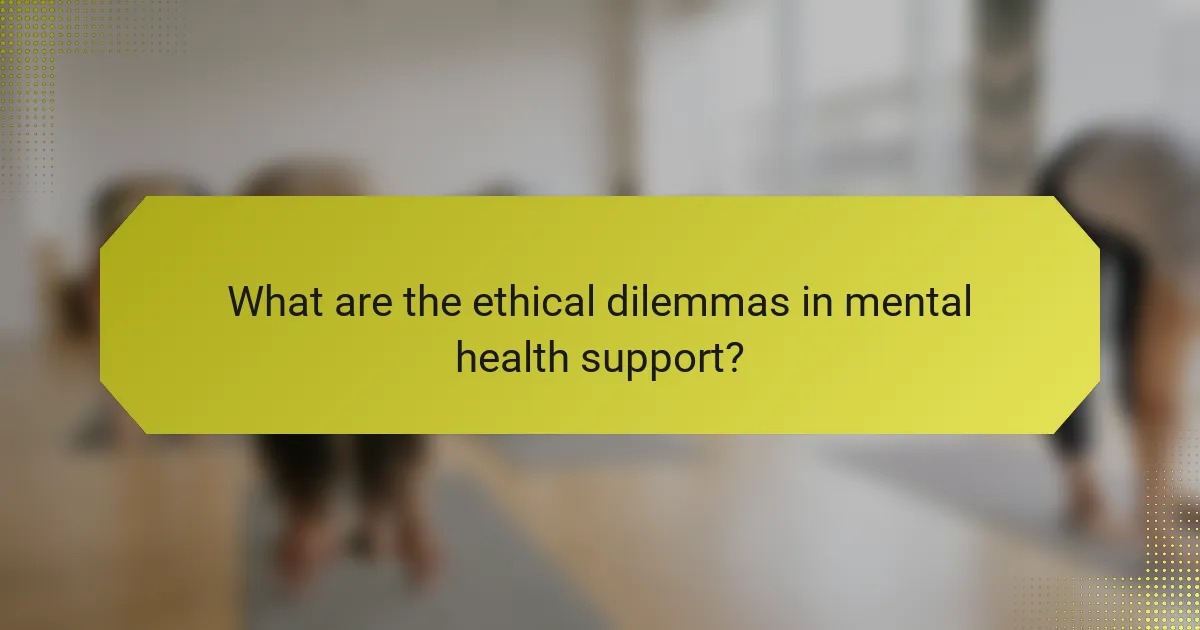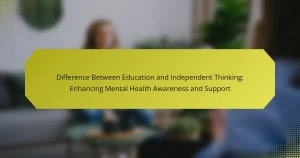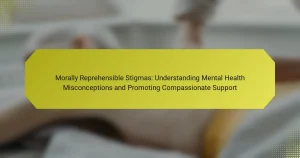Navigating moral questions in mental health involves addressing ethical dilemmas such as patient autonomy, confidentiality, and informed consent. This article explores the balance between intervention and respect for individual choice, the implications of coercion, and the disparities in access to mental health resources. Ongoing dialogue and education are essential for effectively managing these complex issues.

What are the ethical dilemmas in mental health support?
Ethical dilemmas in mental health support include balancing patient autonomy with the need for intervention. Key issues involve confidentiality, informed consent, and the potential for coercion. For instance, mental health professionals often face challenges when patients refuse treatment, raising moral questions about duty of care versus respect for individual choice. Additionally, disparities in access to mental health resources can lead to ethical concerns regarding equity and justice in care delivery. These dilemmas require ongoing dialogue and education to navigate effectively.
How do cultural perspectives influence mental health ethics?
Cultural perspectives significantly shape mental health ethics by influencing values, beliefs, and practices related to mental health care. These perspectives affect how mental illness is perceived, the stigma associated with it, and the ethical considerations in treatment. For instance, collectivist cultures may prioritise community support over individual autonomy, impacting consent and confidentiality. This cultural context can lead to unique ethical dilemmas, such as balancing cultural traditions with modern mental health practices. Understanding these influences is crucial for mental health professionals to provide culturally competent care and navigate ethical challenges effectively.
What role do mental health professionals play in ethical decision-making?
Mental health professionals play a crucial role in ethical decision-making by balancing client welfare and professional standards. They assess situations, apply ethical guidelines, and navigate complex moral dilemmas. This involves understanding the unique attributes of each case, including client needs, cultural factors, and legal requirements. Their support fosters informed choices and promotes ethical practices within the mental health field.
What guidelines govern ethical practices in mental health?
Ethical practices in mental health are governed by guidelines that prioritise client welfare, informed consent, and confidentiality. These principles ensure that mental health professionals act with integrity and respect for individuals. The American Psychological Association outlines core ethical standards, including beneficence, non-maleficence, and justice, which guide practitioners in their decision-making. Additionally, ongoing education and adherence to legal regulations are crucial for maintaining ethical standards in practice.
What are the implications of informed consent in mental health?
Informed consent in mental health ensures patients understand their treatment options and the associated risks. This ethical principle respects autonomy, fostering trust between patients and providers. It promotes transparency, allowing patients to make informed decisions about their care, which can enhance treatment outcomes. Additionally, informed consent can reduce legal risks for practitioners by documenting patient understanding and agreement.
How does informed consent vary across different mental health treatments?
Informed consent varies across different mental health treatments based on the complexity and nature of the treatment. For psychotherapy, clients typically receive detailed information about the process, goals, and risks involved, ensuring they understand their rights and the therapeutic limits. In contrast, for pharmacological treatments, consent includes understanding medication effects, side effects, and alternative options.
Unique attributes like the treatment setting also influence consent processes. For instance, inpatient settings may have more stringent consent requirements due to the nature of care and potential involuntary treatment. Additionally, cultural factors can impact how informed consent is perceived and communicated, emphasising the need for tailored approaches in diverse populations.
Overall, ethical considerations in mental health demand that practitioners ensure clarity, respect autonomy, and foster ongoing dialogue about consent throughout the treatment journey.
What are the unique challenges of confidentiality in mental health?
Confidentiality in mental health faces unique challenges, including ethical dilemmas and legal obligations. Mental health professionals must balance patient privacy with the need to disclose information in cases of harm. Stigma surrounding mental health can also deter individuals from seeking help, exacerbating confidentiality concerns. Furthermore, the rise of digital health records introduces risks related to data breaches and unauthorised access, complicating confidentiality efforts.
How do legal requirements affect confidentiality?
Legal requirements can significantly limit confidentiality in mental health by mandating disclosure of certain information. Laws such as mandatory reporting laws require professionals to report suspected abuse or threats to self or others. These regulations aim to protect vulnerable individuals but can create ethical dilemmas for practitioners. Additionally, legal frameworks may dictate how patient records are stored and shared, impacting privacy. Balancing legal obligations with ethical considerations remains a challenge in mental health practice.
What are the universal principles of mental health education?
The universal principles of mental health education focus on promoting awareness, understanding, and support. They include respect for individual differences, the importance of empathy, and the need for accessible resources. These principles guide ethical practices in mental health education and support systems. By fostering a supportive environment, mental health education can empower individuals to seek help and improve their well-being.
What core features should mental health education programs include?
Mental health education programs should include comprehensive content on ethical principles, support systems, and resource accessibility. Key features are interactive learning modules, real-life case studies, and training in empathy. Programs must address stigma reduction and promote mental health literacy. Evaluations and feedback mechanisms are essential for continuous improvement.
How can mental health education empower individuals?
Mental health education empowers individuals by providing knowledge and skills to manage their well-being. It fosters resilience, promotes awareness of mental health issues, and encourages supportive environments. Education enhances understanding of ethical considerations in mental health, guiding individuals to navigate complex moral questions. As a result, informed individuals can advocate for themselves and others, leading to improved mental health outcomes.
What innovative resources are available for mental health support?
Innovative resources for mental health support include digital platforms, community programs, and educational tools. Teletherapy services provide accessible counselling, while apps like Headspace offer mindfulness practices. Community initiatives foster peer support and awareness. Educational resources enhance understanding of mental health ethics. These approaches address diverse needs, promoting well-being and informed decision-making.
How do digital platforms enhance mental health education?
Digital platforms significantly enhance mental health education by providing accessible resources, fostering community support, and promoting awareness. These platforms offer a variety of tools, such as online courses and webinars, which cater to diverse learning styles.
Additionally, they facilitate peer support groups, allowing individuals to share experiences and coping strategies. Research indicates that online mental health resources can improve knowledge retention and engagement, making education more effective.
These platforms also address ethical considerations by ensuring user anonymity and providing accurate information, which is crucial in sensitive topics like mental health. Overall, digital platforms play a vital role in expanding mental health education and support.
What are the rare ethical considerations in mental health research?
Rare ethical considerations in mental health research include participant autonomy, informed consent complexities, and the potential for stigma. Researchers must navigate the balance between scientific inquiry and respect for individual rights. Unique challenges arise when dealing with vulnerable populations, such as minors or those with cognitive impairments. Additionally, the implications of findings on public perception can lead to unintended consequences, necessitating careful ethical scrutiny.
How do ethical standards evolve in mental health studies?
Ethical standards in mental health studies evolve through ongoing dialogue, research findings, and societal changes. These factors influence guidelines and practices to prioritise participant welfare and informed consent. Continuous education and training in ethics are essential for researchers and practitioners. Additionally, feedback from diverse communities helps refine ethical considerations, ensuring they remain relevant and effective.
What common mistakes should be avoided in mental health support?
Avoiding common mistakes in mental health support is crucial for effective assistance. Key errors include offering unsolicited advice, minimising the person’s feelings, and failing to maintain confidentiality. Additionally, neglecting to educate oneself on mental health issues can lead to misunderstandings. It’s important to listen actively and validate experiences without judgement.
How can individuals navigate moral questions in their mental health journeys?
Individuals can navigate moral questions in their mental health journeys by seeking clarity, support, and education. Engaging with mental health professionals provides ethical guidance tailored to personal experiences. Support groups foster shared insights, enhancing understanding of moral dilemmas. Educational resources, such as workshops and literature, offer frameworks for ethical decision-making. Exploring these avenues empowers individuals to make informed choices aligned with their values, promoting personal growth and well-being.


